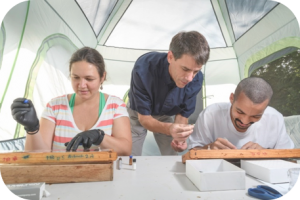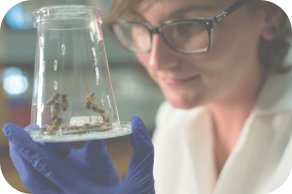Posted on August 28, 2019
The UNC Greensboro Plant and Pollinator Center has a new facility in Gateway Research Park, with an indoor laboratory space of 3500 square feet and an outdoor space larger than a football field. The research conducted at Gateway addresses the dire problems facing honey bees and other pollinators through a comprehensive approach that’s unique in the field of study. By connecting both plant and pollinator research in its new, larger space at Gateway North, the Plant and Pollinator Center brings together all aspects of work related to honey bee health. The entire human population relies on plants and pollinators, which, in turn, need each other to survive. More than three-quarters of major food crops including fruits and vegetables require pollination by bees. In addition to serving students and faculty, the Plant and Pollinator Center has plans to interact with the community at large, through programs for students, beekeepers, master gardeners and others.
 Dr. Olav Rueppell, a Principal Investigator of the UNCG Plant and Pollinator Center, said, “We selected Gateway Research Park as a wonderful space for integrated research and engagement with the whole community. Gateway North is a beautiful, natural setting for our work.” Gateway Executive Director John Merrill said, “The UNCG Plant and Pollinator Center is a highly valuable addition to Gateway, not only because of the important work they do, but also because it brings opportunities to collaborate in new ways.”
Dr. Olav Rueppell, a Principal Investigator of the UNCG Plant and Pollinator Center, said, “We selected Gateway Research Park as a wonderful space for integrated research and engagement with the whole community. Gateway North is a beautiful, natural setting for our work.” Gateway Executive Director John Merrill said, “The UNCG Plant and Pollinator Center is a highly valuable addition to Gateway, not only because of the important work they do, but also because it brings opportunities to collaborate in new ways.”
The new location provides research and classroom space with three state-of-the-art rooms, including a community engagement room for classroom instruction and meetings, a lab for processing and storing samples from the field and a clean lab for molecular and microbial analyses. The adjacent outdoor area is being used for pollinator-friendly green space and experimental planting plots and as an apiary.
At UNCG, Drs. Olav Rueppell and Kasie Raymann have been conducting research on honey bees, including their genetics, the social behavior of honey bees and the causes of honey bee diseases along with potential means to remedy them. “Something is making viruses more lethal to honeybees and their immune systems are being compromised by poor nutrition,” said Dr. Rueppell. He explained that crops, such as corn and wheat, no longer have weed flowers in their fields as they used to, making the fields a virtual desert that lacks the nutrition honey bees need.
 While Dr. Rueppell’s research is on viruses affecting the honey bee population and mites that
While Dr. Rueppell’s research is on viruses affecting the honey bee population and mites that
vector the viruses, his colleague Dr. Kasie Raymann, Assistant Professor in Biology, focuses on microbiomes, which live in the honey bee gut and help bees metabolize nectar into honey and get protection against pathogens. “Microbiomes are bacteria that live inside of an organism and are important for the health of bees,” said Dr. Raymann. “As social insects, bees get their microbiomes from other bees in the hive. These microbes are essential to metabolize nectar to honey and also provide natural disease resistance. Antibiotics and pesticides can alter the microbiomes that bees require to be healthy.”
UNCG faculty Drs. Ayalew Ligaba-Osena and Sally Koerner conduct environmental research on plant health and productivity that will be central to the research mission at the location. Dr. Sally Koerner’s work concentrates on how the ecosystem and especially climate change affect plants and pollinators. Dr. Koerner uses applied and basic research to see how changes in the global environment affect plants and what can be done to help honey bees adapt and thrive. Her studies include the diversity of plant life, with particular interest in the savannas found in the U.S. and Africa. The fourth co-director of the Plant and Pollinator Center, Dr. Ayalew Ligaba Osena, studies plant biotechnology to improve the utility of underutilized agricultural crops, such as teff. His efforts to advance the diversity of agricultural crops may ultimately not only help feed humanity but also provide a more sustainable environment for our pollinators. “By linking plant and pollinator research, we’re researching all aspects of work related to honey bee health,” added Dr. Raymann. “The work we’re doing will put us on the map.”